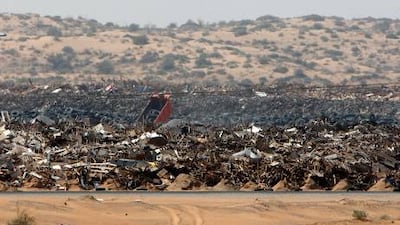SHARJAH // The emirate's zero-waste target is good news for the environment, but experts say it may be too good to be true.
Sharjah, which recycles about a third of its waste, aims to effectively stop sending any waste to landfills by 2015.
The goal was announced last week by the municipal company Bee'ah, which manages waste in Sharjah.
On Monday, Sharjah announced it will invest Dh100 million in waste-collection equipment and plastic rubbish bins for households. The programme will take effect from next year.
But most of the emirate's recycling is of materials from construction and demolition sites. Less than 10 per cent of household waste in the emirate is recycled.
Experts were sceptical that the emirate would achieve its 2015 target.
"With the current level of recycling, that seems to be a very ambitious target," said Nigel Mattravers, the director at Grant Thornton, a British government and infrastructure advisory with an office in Dubai.
"There needs to be an integrated plan behind this."
One key, Mr Mattravers said, would be legislation that increased the price of leaving waste in landfills. Private companies now pay Dh50 for every tonne of waste dumped, which is substantially less than in countries with high recycling rates.
The Netherlands recycles 80 per cent of its waste and burns 16 per cent. What little is left is sent to landfills for a tax of €110 (Dh552) a tonne.
Khaled Al Huraimel, the chief executive at Bee'ah, said the company was in discussions with the municipality over a possible rise in landfill fees.
Until then, dumping may be the easier thing for companies to do.
"While people are still allowed to dump waste very cheaply, it is hard to make the business case for building a recycling plant or a reprocessing plant," Mr Mattravers said.
Enforcement agencies are also important, he said, because if fees increased, so too would the number of people who were willing to avoid paying by dumping rubbish illegally.
Glenn Platt, an environmental manager at KEO Infrastructure, a consultancy with offices in Dubai and Abu Dhabi, had a similar opinion.
"Zero waste is a great ideal to strive towards but there need to be a number of steps to take to get at least close to that," said Mr Platt.
Legislative change, incentives for the recycling industry, enforcement and building public trust are all important, he said.
"Without those, we will struggle to get there," Mr Platt said. "We cannot disguise the fact that we generate a lot of waste. Governments here are realising there is a need to do something … they are making some right steps but they need to do more."
Mr Al Huraimel said one way Bee'ah could achieve its target was by building an incinerator.
"We have been negotiating with several companies for the past year," he said. "We are still looking for the best technology to work with."
The company is expected to announce its plans next year.
Incinerators have caused significant levels of air pollution, but new technologies can ease the problem and the heat produced by incinerators can be trapped to generate electricity.
Bee'ah is scheduled to introduce its recycling programme in villa compounds and low-rise buildings early next year. Residents will be asked to use two bins - a blue one for recyclable materials such as plastic, paper, glass and metal; and a green one for general waste.
Also in the works are plans to build a visitor centre at the factory where Sharjah's waste is sorted into different types of recyclables. The centre is scheduled to open in 2013.
Bee'ah last week signed a memorandum of understanding with NL Agency, a body under the Dutch ministry of economic affairs that works on projects in sustainability and innovation.

